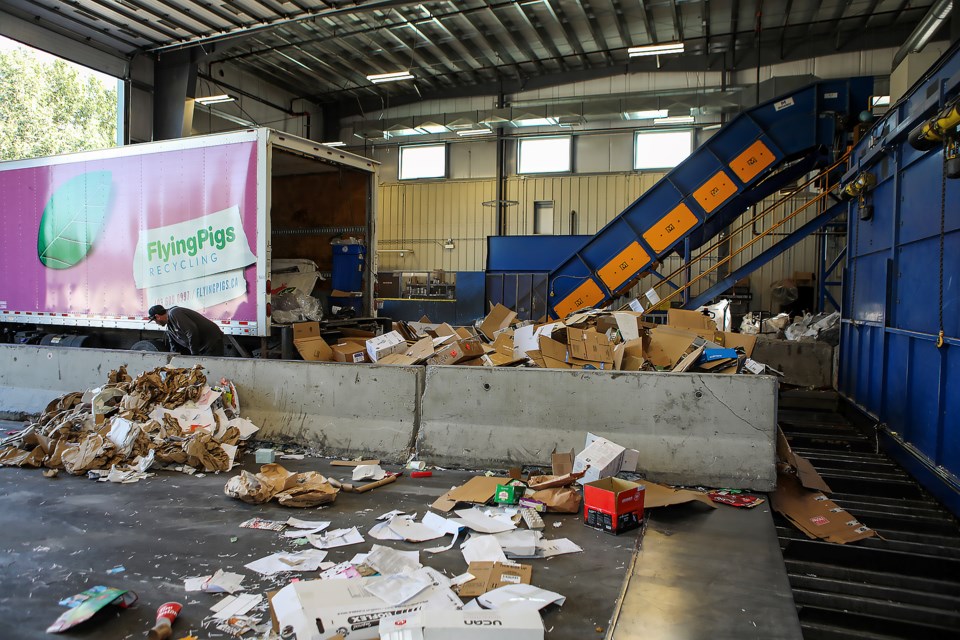CANMORE – A renegotiated multi-year waste contract significantly closer to the Bow Valley will give the Town of Canmore its biggest greenhouse gas (GHG) emission reduction.
The contract will have Canmore’s waste hauled to the nearby Spyhill landfill operated by the City of Calgary, replacing its long-term use of West Dried Meat Lake Regional landfill near Camrose.
The biggest impact will result in a roughly 60 per cent reduction in GHGs in hauling and disposal of waste, which is estimated at about 1,200 tonnes of GHGs. The Calgary landfill will also have gas capture ability since landfills produce methane, which is about 25 per cent worse than CO2 emissions.
“By hauling our waste to Calgary, it will actually be the largest single action the Town has done to reduce our greenhouse gas footprint,” said Simon Robins, the Town of Canmore’s supervisor of solid waste services.
“The big thing is the gas capture. We’ll be reducing our greenhouse gas footprint.”
Robins said it will reduce the Town’s GHG footprint by 15 per cent, with all municipal-led solar projects the equivalent of reducing 500 CO2 emissions.
The trip to the Calgary facility is relatively short – now 200 kilometres round-trip – compared to the existing trek to West Dried Meat Lake Regional landfill is a roughly 700km roundtrip to a site that doesn’t capture landfill gas.
The cost per CO2 emission per tonne is $1.37 to go to West Dried Meat Lake, while it will be $0.82 per CO2 emission per tonne to go to Calgary.
“This is the first time that cost equilibrium has hit the sweet spot,” Robins said. “We’ve looked at it in the past since we’ve always thought that’s a long way for our garbage to go, but Calgary’s tipping rates were higher, so we weren’t able to do it.”
The deal with the Town of Banff – which has trucked Canmore’s waste since 2016 – will run until 2026 with options to extend through 2028. The contract has a $3,000 increase for 2024, with it costing the municipality about $500,000 annually.
A staff report noted it aligns with council’s strategic plan to limit Canmore’s impact on the environment and the recently passed Climate Emergency Action Plan that has a recommendation to use a landfill that captures landfill gas.
“This looks to me to be an improvement with very little extra cost – not only a little improvement, but a massive environmental benefit,” Mayor Sean Krausert said.
Canmore has used West Dried Meat Lake Regional landfill since 2013 due to the cost of transporting and disposing of waste was cheaper than Calgary. The report noted Calgary has continually been looked at, but Calgary has been “cost prohibitive.”
When the Town of Banff asked in Sept. 2023, to renegotiate the contract with Canmore, informal quotes were gathered from other hauling companies.
“Through this process, it came to light that the cost differential for hauling to Calgary had drastically reduced. With this knowledge, administration requested that the Town of Banff work towards hauling to Calgary,” stated the report.
The Town of Banff took over hauling Parks Canada’s waste in 2011 – taking over for Wilderness Waste Management – when the federal agency sole-sourced it to the municipality. In 2015, the Town began exploring its options for hauling its waste, which was previously done by Boot Trucking and organized by the Bow Valley Waste Management Commission.
Robins said the Town of Banff has delivered “incredible service,” but the Town of Canmore has occasionally looked at costs related to bringing waste hauling in-house. He noted it would involve large capital costs and likely impact tipping fees since Banff and Canmore receive a better rate for combining waste removal.
Coun. Tanya Foubert noted that in the future when the contract expires and it’s up for renewal, she’d like to see the contract go through a competitive bidding process.
“The original contract with the Town of Banff was sole-sourced and not a competitive process. While I support renewing … and they deliver a good service, in the future I think the public interest would be served by a competitive process since waste hauling is a competitive industry and we don’t need to sole-source the contract in the future,” she said.
ADDITIONAL FUNDING FOR NEW WASTE COLLECTION VEHICLES
Council also approved an additional $105,000 to fund the purchase of three new collection vehicles.
Two three-tonne and one one-tonne vehicles were previously approved in the 2021 and 2022 budgets, but the staff report stated supply chain issues led to the truck chassis not being available until late 2023.
The delay led to the vehicle order confirmations being pushed back and inflationary demands led to the price increase. The vehicles are anticipated for delivery by the end of the year.
A three-tonne vehicle jumped from $300,000 to $320,000, while the second three-tonne truck went from $300,000 to $355,000 and the one-tonne truck from $250,000 to $280,000.
The money will come from the solid waste collection and solid waste recycling reserves.
The project summary noted the three vehicles are replacements. It highlighted the two three-tonne trucks run 364 days a year, while the one-tonne truck had 10 years of service as of 2022. As of August 2018, it had just under 50,000 km and about 4,100 hours of runtime.
“The nature of our work is quite demanding on the vehicles,” stated the project summary.




